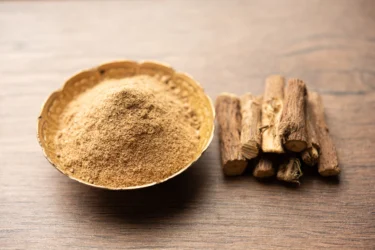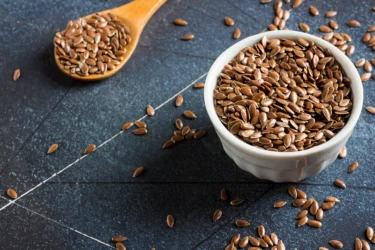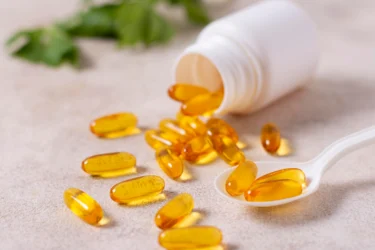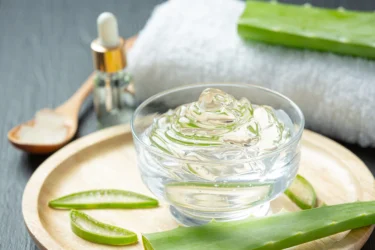Simple Home Remedies to Help Ease PCOS Symptoms
By Dr. Charmi Shah +2 more

Get,

to manage your symptom
Get your,


4 Cr+ families
benefitted

OTP sent to 9988776655



You’ve successfully subscribed to receive
doctor-approved tips on
Whatsapp

Get ready to feel your best.

Hi There,
Download the PharmEasy App now!!


Register to Avail the Offer
Send OTPBy continuing, you agree with our Privacy Policy and Terms and Conditions

Hi There,
Sign up on PharmEasy now!!
Trusted by 4 crore+ families

OTP sent to 9988776655



You have unlocked 25% off on medicines




Code: NU25
By Dr. Charmi Shah +2 more
Table of Contents
Polycystic ovary syndrome (PCOS), also known as polycystic ovarian syndrome or Stein-Leventhal syndrome, is a complex condition caused by a mix of genetic, hormonal, and lifestyle-related factors. In this disorder, women experience symptoms like irregular and/or painful periods and excessive body hair due to the overproduction of the male hormone, which is normally present in small amounts in females1. This disorder affects around 5-10% of women of childbearing age in the world. Women with PCOS are at a higher risk of developing type 2 diabetes mellitus, high blood pressure, and heart diseases2. Lifestyle modifications like diet, exercise and medicines help control the symptoms3, but there is no cure for this disorder.

The exact cause of PCOS is not yet known, however, it is known that it is associated with insulin resistance (the body is either unable to generate insulin or is not able to utilise it). The other factors which are known are also in some way related to insulin resistance. The various factors for the development of PCOS include:
PCOS should be diagnosed by a doctor. However, there are certain symptoms you can watch out for, such as:
The following herbal remedies, taken under the supervision of a doctor, may be useful in managing the symptoms of PCOS:

Mulethi is also known as liquorice. It may be beneficial for managing PCOS as it acts against androgens and can also help reduce estrogen (female hormone) and testosterone (male hormone) levels5. You can take a cup of hot water, mix mulethi root powder in it and drink it. This brew can be taken for two months. For a prolonged effect, you can take it for even longer.

It was found in studies6 that flaxseeds contain a compound called lignan, which may help in decreasing the level of androgens in the body. They caused a reduction of symptoms of PCOS that occur due to increased androgen levels, like abnormal growth of body hair. They were also found to help in weight reduction. The consumption of flaxseeds, by adding them into your daily diet in the form of milkshakes and smoothies or by directly consuming them, can be beneficial for your overall health as well.

Cinnamon may help improve the function of insulin receptors, which provides a beneficial effect for women with PCOS. It was also found by researchers that supplementation of cinnamon in diet can improve hormonal levels in women with PCOS7. It can be consumed daily by adding it to water while preparing tea. It can also be consumed in tablet form, which is more concentrated, but you should consult your doctor before doing so.

Studies8 have shown that by taking omega-3 fatty acids supplements, testosterone levels can be reduced and the menstrual cycle can be regulated. However, no change in weight, bleeding, size of the ovary or number of ovarian follicles was observed. Fish oil supplementation showed that omega-3 fatty acids consumption can potentially decrease waist circumference, waist-hip ratio, and body mass index9.

Chamomile tea was found to reduce the symptoms of PCOS in animal studies. In the same study10, when the tissues of the ovary were observed under a microscope after treating with chamomile extract, the signs of PCOS were decreased. However, more research on humans is required to ascertain these findings. We can brew chamomile tea by adding a spoonful of chamomile to warm water or using a chamomile tea bag.

Aloe vera is used along with certain other compounds to make formulations to manage PCOS, as it helps restore the levels of a hormone in the ovaries. These were the findings of an animal study11. Further research on aloe vera gel’s effect on humans is needed.

Nirgundi is an herb that has many medicinal properties. It acts against insulin resistance, helps decrease androgen levels12, and has similar activity to estrogen13. Therefore, it may have beneficial effects on women with PCOS.
You can eat bitter gourd as a vegetable or drink its juice. This may help control blood sugar levels. Amla or Indian gooseberry also has a similar effect.
Fenugreek leaves and tulsi or basil may help maintain insulin levels. PCOS patients have high levels of insulin, as it remains unused in the body, increasing blood sugar levels.
Dr. M.G. Kartheeka, MBBS, MD(Pediatrics)
Also Read: Home Remedies for Dark Underarms
When you observe any symptoms of PCOS, you should consult a doctor right away. This will prevent worsening of the condition.
Also Read: 8 Powerful Ayurvedic Herbs With Their Great Benefits
PCOS is a complex condition, and there is a need for further research to know the exact mechanism and cause of it. PCOS cannot be treated; therefore, the early and rigorous management of symptoms plays an important role in making sure the condition does not worsen. Lifestyle modifications, weight management, and the diligent use of certain herbs have shown great results in women with PCOS. While there’s no cure for PCOS yet, science continues to offer better ways to understand and manage it. With the right medical support, lifestyle changes, and informed choices, most women with PCOS can lead healthy, fulfilling lives.
Also Read: Effective Home Remedies for Blackheads
No, PCOS is not a communicable disease. There is a risk that the disease may occur in families, but the exact mechanism and reason for the occurrence are unknown2.
There is no treatment for PCOS, but thesymptoms associated with PCOS can be managed. There are no reports stating the beneficial effects of honey on the symptoms of PCOS.
Chamomile tea has an anti-inflammatory action and may help reduce period pain. Therefore, it may be beneficial for PCOS1,9.
Yes, loss of scalp hair can occur in PCOS. Other symptoms of PCOS include irregular periods, infertility, and excessive hair growth on the face, stomach, and thighs3.
Disclaimer: The information provided here is for educational/awareness purposes only and is not intended to be a substitute for medical treatment by a healthcare professional and should not be relied upon to diagnose or treat any medical condition. The reader should consult a registered medical practitioner to determine the appropriateness of the information and before consuming any medication. PharmEasy does not provide any guarantee or warranty (express or implied) regarding the accuracy, adequacy, completeness, legality, reliability or usefulness of the information; and disclaims any liability arising thereof.
Comments

Leave your comment...
You may also like
Comments